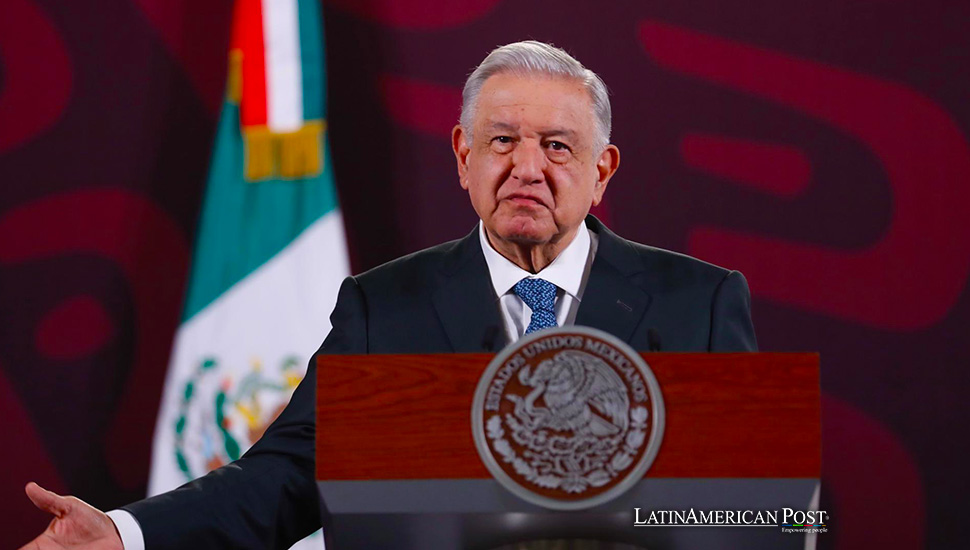Mexico’s President Refutes Allegations of Cartel Funding in 2006 Campaign

Mexico’s President vehemently denies claims of receiving drug cartel funds during his 2006 campaign, as reported by ProPublica, Insight Crime, and Deutsche Welle. These reports rely on testimonies from U.S. drug enforcement officials and their Mexican informants.
Controversial Allegations Surface
Mexico’s President Andrés Manuel López Obrador has firmly rejected allegations that drug cartel leaders financed his first presidential campaign in 2006. These claims suggest a quid pro quo arrangement, where cartels would receive support for their criminal operations from his future government. The controversy has sparked a significant debate about the integrity of political campaigns and the influence of organized crime in Mexico.
The allegations surfaced in detailed reports by renowned investigative news outlets, including ProPublica, Insight Crime, and Deutsche Welle. These reports rely on testimonies from U.S. drug enforcement officials and their Mexican informants. According to these sources, at least $2 million from significant cocaine traffickers was allegedly funneled to López Obrador’s campaign. This financial support is said to have continued during the turbulent period following the election.
Central to these allegations are accounts from individuals who were close aides to López Obrador during his campaign. The reports paint a complex picture of political and criminal entanglement, raising questions about the extent of cartel influence in Mexican politics.
Responding to these allegations, López Obrador dismissed them as “completely false” and “slander.” During a regular morning press conference, he emphasized the lack of concrete evidence to support these claims, branding them as “vile slander.” His strong denial reflects the polarized political climate in Mexico, where accusations of corruption and illicit dealings are uncommon in high-stakes politics.
Critical Juncture: 2006 Election and Aftermath
The 2006 presidential campaign was a critical juncture in López Obrador’s political career. Running as a leftist candidate, he narrowly lost the election to conservative Felipe Calderón by less than 1 percent of the vote. Calderón’s subsequent tenure was marked by a controversial and violent war against Mexico’s powerful drug cartels. This period in Mexican history was characterized by heightened violence and a substantial increase in drug-related crimes, drawing widespread criticism and concern both domestically and internationally.
López Obrador, known for his nonconfrontational approach to security and organized crime, has consistently claimed that he was unfairly denied the presidency in 2006. Following the election, he led a significant protest movement, culminating in a symbolic ceremony in downtown Mexico City where thousands of his supporters declared him the “legitimate president.” This movement highlighted the deep divisions and political unrest in Mexico.
One of the most notable findings in ProPublica’s report alleges that a prominent cartel leader financially supported López Obrador’s supporters, specifically for food during this protest period. If true, this would suggest a level of interaction between political movements and criminal organizations that is deeply troubling.
Broader Implications: Politics, Crime, and Governance
These allegations and López Obrador’s subsequent denial have reignited discussions about the nature of Mexico’s political landscape. The intertwining of politics and criminal activity, especially in the context of drug cartels, poses a significant challenge to the country’s governance and democratic institutions. The situation calls for a careful examination of the influence of illicit funds in political campaigns and the need for transparency and accountability in political financing.
Furthermore, these claims have international implications, considering the role of U.S. drug enforcement officials in the investigation. The involvement of international agencies underscores the global nature of drug trafficking and its pervasive impact on politics and society.
Also read: Mexico’s Historic Election Polls Maintain Female Leadership in Sight
The allegations against López Obrador regarding cartel financing in his 2006 presidential campaign have sparked a significant controversy in Mexico. While the President has categorically denied these claims, the situation raises important questions about the influence of organized crime in Mexican politics. The unfolding of this story will be closely watched, as it has significant implications for the country’s political integrity and its ongoing battle against drug cartels.





